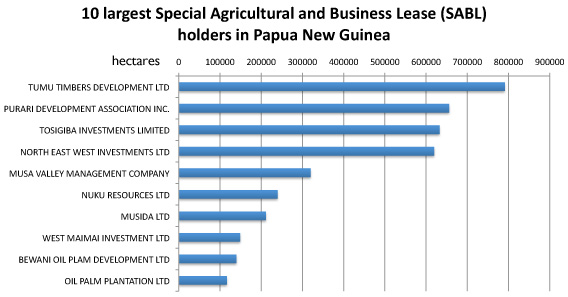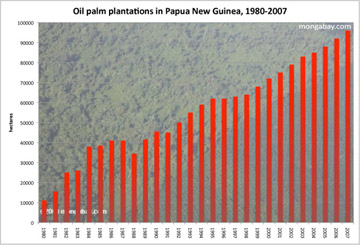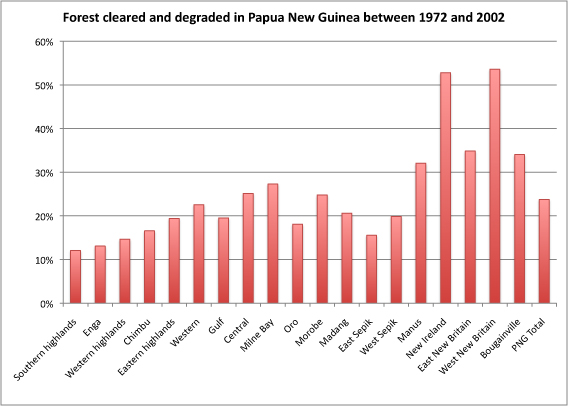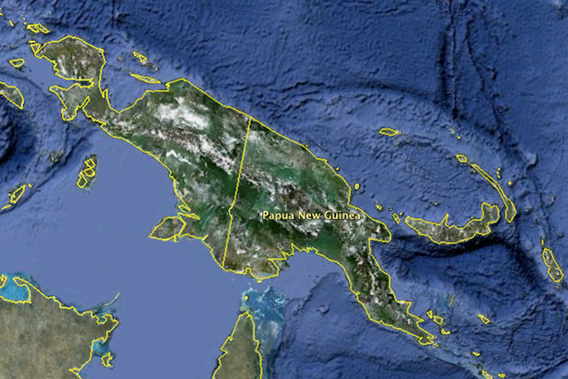This is a guest post by Jeremy Hance from mongabay.com
In March 2011, 26 experts—biologists, social scientists, NGO staff—met to craft a statement calling on the Papua New Guinea government to stop granting Special Agricultural and Business Leases (SABLs). According to the group, these leases circumvent PNG’s strong community land rights laws and imperil some of the world’s most intact rainforests. To date, 5.6 million hectares (13.8 million acres) of forest have been leased under SABLs, an area larger than all of Costa Rica.
Titled ‘The Cairns Declaration’, the statement reads: “Papua New Guinea is among the most biologically and culturally diverse nations on Earth. [The country’s] remarkable diversity of cultural groups rely intimately on their traditional lands and forests in order to meet their needs for farming plots, forest goods, wild game, traditional and religious sites, and many other goods and services.”
According to the statement, all of this is threatened by the PNG government using SABLs to grant large sections of land without going through the proper channels. Already 2 million hectares (nearly 5 million acres) of the leased land has been slated for clearing by the aptly named ‘Forest Clearing Authorities’.
Daniel Ase, Executive Director of the Center for Environmental Law and Community Rights (CELCOR) in PNG, told the meeting that this was “massive land grabbing […] basically for large scale industrial logging,” adding that, “most of these areas are located in areas of high biodiversity.”

The SABLs undercut indigenous communities by handing land over to largely foreign and multinational corporations for leases that last 99 years, severing indigenous people from their land for generations. Last year, 2.6 million hectares (6.4 million acres) were granted under SABLs. Local communities have often not consented to the deals and in some cases weren’t notified.
Talking with mongabay.com, William Laurance, a leading conservation biologist with James Cook University, explained that, “virtually all of Papua New Guinea is owned by one communal group or another, and at least in theory these groups have to approve any development on their land. This is one of the key reasons for the SABLs—it’s a way for the government to carve off large chunks of land for major logging and other developments, and to greatly diminish the role of local communities.” According to Laurance, the revenue made from these deals is not aiding poverty alleviation efforts in Papua New Guinea, the profits are instead “mostly ending up in the hands of foreign corporations and political elites in Papua New Guinea.”
“For instance, local communities in Papua New Guinea are capturing only around $10 per cubic meter of kwila, one of their most valuable timbers, whereas the same raw timber fetches around $250 per cubic meter on delivery to China,” says Laurance, adding that, “many of the major socioeconomic indicators for Papua New Guinea have fallen in the past decade, indicating a decline in living standards even as the country is experiencing a huge resources boom.”
While this may seem contrary to expectations, it is a pattern that has been repeated in many poor countries with great wealth in natural resources. Known to economists as the ‘resources curse’, such nations see their natural resources exploited while receiving little to no economic gain. Instead, promised funds are lost to bad business deals, corrupt politicians, or ‘predatory’ foreign corporations.
The Cairns Declaration makes a similar point: “SABLs are a clear effort to circumvent prevailing efforts to reform the forestry industry in Papua New Guinea, which has long been plagued by allegations of mismanagement and corruption.”
Unlike much of Southeast Asia, it has long been thought that Papua New Guinea had avoided massive deforestation, thereby retaining one of the last great rainforests outside of the Congo and the Amazon. However, a 2009 study found that between 1972-2002, nearly a quarter of the country’s forests were lost or degraded by logging.
At the time of the study, the lead author, Dr. Phil Shearman, Director of the University of Papua New Guinea’s Remote Sensing Centre, said that, “Forests in Papua New Guinea are being logged repeatedly and wastefully with little regard for the environmental consequences and with at least the passive complicity of government authorities.”
 While logging for timber is the primary cause of forest loss in PNG, the palm oil industry is on the rise. Palm oil has become targeted by environmentalists for being, at least in part, responsible for the environmental crises facing Malaysia and Indonesia.
While logging for timber is the primary cause of forest loss in PNG, the palm oil industry is on the rise. Palm oil has become targeted by environmentalists for being, at least in part, responsible for the environmental crises facing Malaysia and Indonesia.
Laurance believes that it doesn’t have to continue this way. PNG could make in-roads against poverty while sustainably managing its forests.
 “First, the country needs to develop a much greater domestic wood-processing industry. That way they can capture more profit and employment from the exploitation of their forests. Right now Papua New Guinea has one of the lowest rates of wood processing of any country in the world. Second, the forests are being seriously over-harvested. They’ll soon exhaust their timber supplies if things keep going as they are now. They need to curtail harvests sharply and focus on developing a timber industry that’s oriented toward value-adding, rather than letting somebody else make the profit.”
“First, the country needs to develop a much greater domestic wood-processing industry. That way they can capture more profit and employment from the exploitation of their forests. Right now Papua New Guinea has one of the lowest rates of wood processing of any country in the world. Second, the forests are being seriously over-harvested. They’ll soon exhaust their timber supplies if things keep going as they are now. They need to curtail harvests sharply and focus on developing a timber industry that’s oriented toward value-adding, rather than letting somebody else make the profit.”
The Cairns Declaration urges the government to place a moratorium on granting new SABLs and handing out approvals to clear forests. An independent review should then be conducted on the legality of the leases.
A version of this post was published first here on mongabay.com



My good country fellow. The words you wrote are very true and have repeatedly being said in a lot of campaign, awareness and consultation gathering but have fallen on hard rocks or brick wall. But let’s not stop talking. Thank you very much.
Our good Prime Minister of our great country PAPUA NEW GUINEA must act immediately and cancel the fraudulent SABL LEASES and return land to legitimate traditional and customary land owners. We lost almost everything thing in all our forest. Papua New Guinea businesses can not do such in other countries and it is very bad for foreign businesses to come and take our forest in front of our eyes.
I THINK, ITS TIME TO LEAVE PEOPLE ON THEIR OWN LAND AND SEA WITHOUT ANY PROBLEMS . THANKYOU .
Tim,
The immediate constraints on agriculture are lack of reliable (or even any) road or transport access, low producer prices for many years (until recently) and various high costs, law and order problems (with crop theft etc), all combining to discourage farmer’s interests.
It’s not all about largeholder production; smallholders have demonstrated that they can greatly increase production when they have the incentive, and of course tree crop exports formerly largely produced on estates have largely been replaced by smallholders for most crops. However, with good estate-smallholder support on an agro-nucleus basis, smallholders can circumvent some of the constraints of poor infrastructural and services provided by government. Some landowners working with agricultural companies have demonstrated that current land laws don’t need to be a constraint to genuine agricultural development, and the recent amendments (which have not yet been gazetted) empower landowners further to utilise portions of their land more commercially if they so choose.
These SABLs, however, undermine genuine agricultural development and dis-empower the landowners. The genuine agricultural development entails thorough work by landowners and companies in identify the owners and securing free and fair consent with respect to agreed portions of their land; these SABLs commit whole community, even wards and sub-districts’ land, including villages, food gardens and tree corps (as well of course as sought-after forest land). It’s a recipe for community dissent; some have already complained that they wouldn’t want to grab their neighbours’ land (as in some approved SABLs) as it would great lasting antipathy. So this is a scheme which attracts short term extractive activities, not genuine agricultural investment or sound land management, whether by smallholders and/o with large investment partners with a longer term horizon.
The genuine major agricultural investors (as well as landowners) are very concerned about this SABL free for all.
When did all 99-year land lease cease in PNG, especially land acquired during Australian administration of PNG since 1906? What will happen to a land title when the lease is over? Do traditional landowners have the right under certain laws to acquire their title from a defunct company deregistered by the company’s registrar?
Interesting comparison of the alleged area of land “grabbed” (sic) in PNG with total area of Costa Rica:
Despite its much smaller area and smaller population, Costa Rica’s total exports per capita 1.7 larger than PNG’s, and 14.34 times larger per square kilometre, and its coffee exports were larger in total than PNG’s from a fraction of PNG’s. The country’s have similar locations and topographies, both are in the tropics and are well suited to coffee.
The main difference is that unlike PNG, Costa Rica is not imprisoned by an absurdly out of date land tenure system.
I am a citizen of this country and I really feel bad when our so call leaders in the Government are not really complying with the country’s constituation. The Constituation really talks about the security of the Indigenous people and their land be the rigthful property of the owner and what ever happens the benefits be shared fairly equal without leaving out any indigenous of the share. But as I see,even though the constituation is there right in front of them as a GUIDE to these leaders,they turned to be BLIND or we could say these leaders do not really understand what ROLE they should play while they are there in that DECISSION making HOUSE. These PUPPETS will be dealt with in our way as their are our people and they knew our way too well. This Special Agriculture Business Lease (SABL) are being proposed by Foreigners and are imposed on the Puppets in our Government who then without any awareness or consultations with Rightful Land/Resource owners which our Constituation Recognised, went ahead and start buldozzing the intention on the Peoples Land, as if it were their’s, what a shame that is if they come to their right mind. We are not blind and I believe the World is watching too. These Foreigners I refer to, we do know you and we want you out of our Land. We want you to know that we are not POOR as you are and struggling every inch to convince our people to buy into your idea. Look at you how many homeless you have that go without food. We ask you go back and help feed your people and comfort them if you are RICH enough. We eat every day we sleep in good shalter we don’t need your AID. We would kindly ask you to take whatever your AID are go home and start getting your back yard up to the STANDARD you require please.